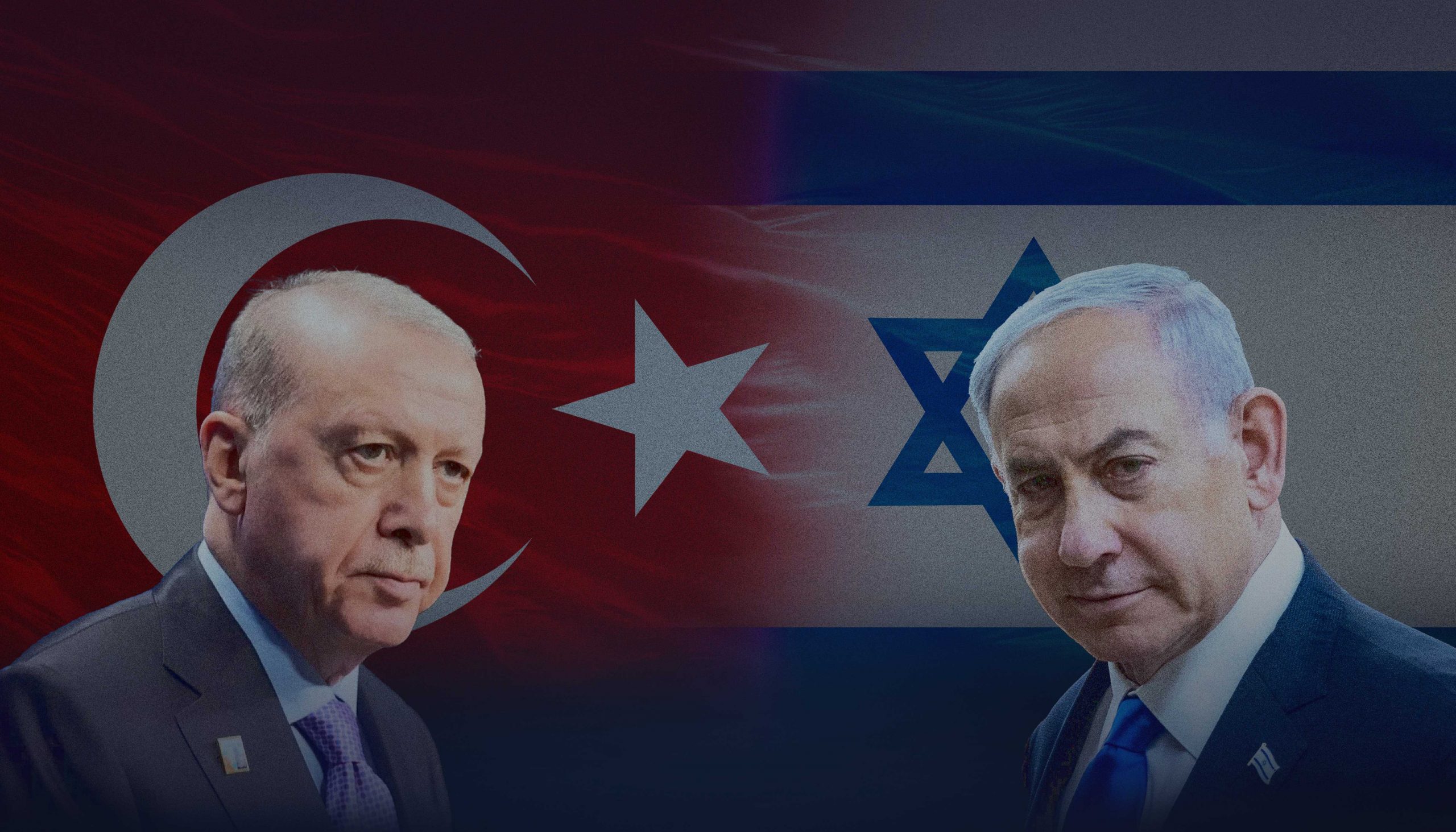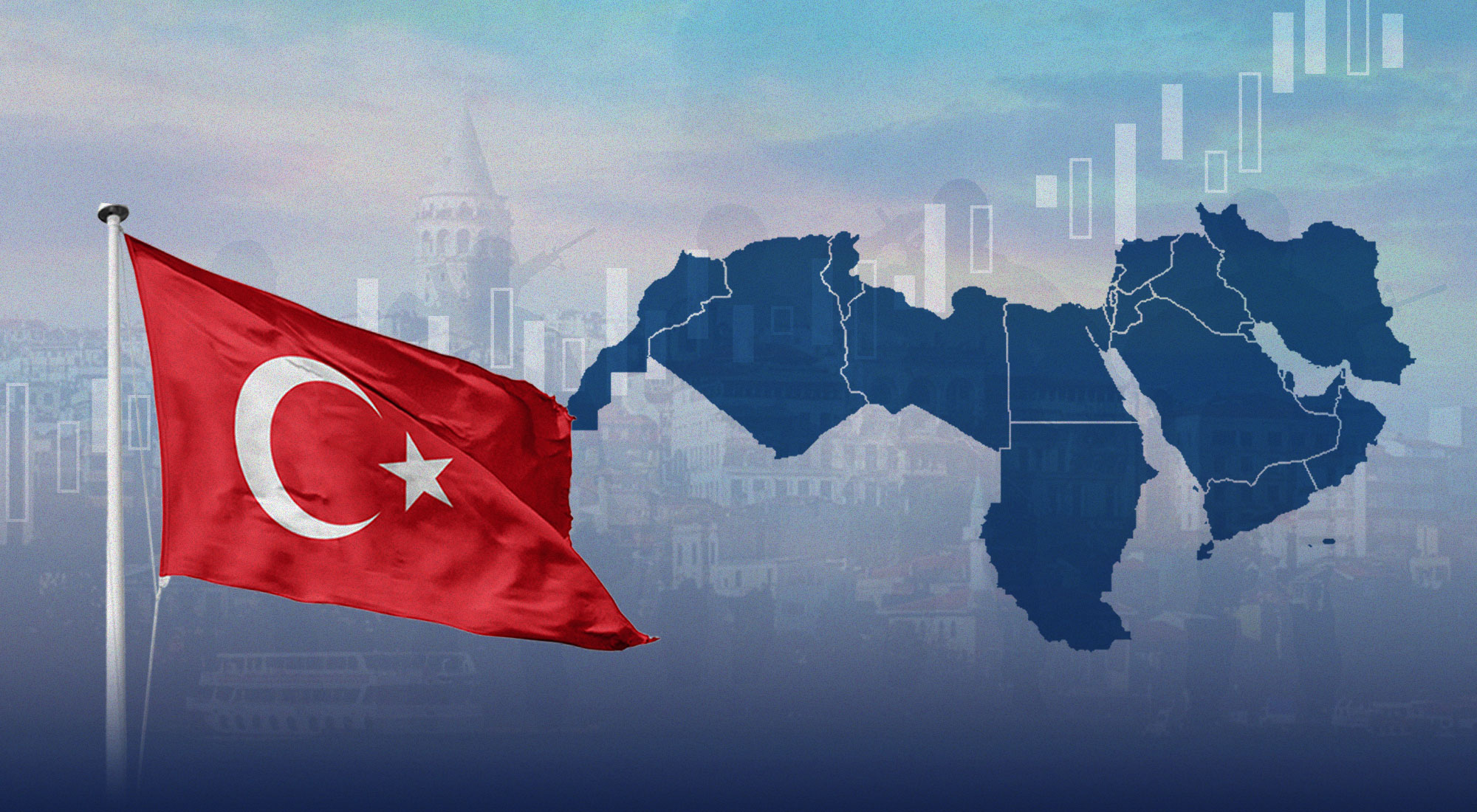The relationship between Türkiye and Israel has been volatile for the majority of the past two decades. As key allies of the United States in the region, both Türkiye and Israel had a brief period of robust security and intelligence cooperation in the late 1990s. The relationship today, however, is markedly different. Relations initially took a major blow when Israeli forces raided a humanitarian flotilla bound for Gaza in 2010,[1] also known as the Mavi Marmara incident, killing 10 Turkish citizens onboard. Türkiye downgraded diplomatic ties with Tel Aviv following the attack, and it took 12 years for complete normalization to take hold. In 2022, Türkiye and Israel agreed to restore diplomatic ties, with ambassadors exchanged in Ankara and Tel Aviv. This brief period of normalization, however, was short-lived, as ties once again deteriorated following Hamas’ terrorist attack on Israel on 7 October 2023 and Israel’s subsequent invasion of the Gaza Strip. Turkish President Erdoğan has been a vocal critic of Israel since the war in Gaza began and has continued to escalate the rhetoric. Türkiye also openly hosts Hamas dignitaries and refutes the Israeli position that the group is a terrorist entity. There is ongoing speculation on the status of Hamas offices in Türkiye, with some Hamas officials allegedly granted Turkish citizenship.
Beyond Gaza, the Palestinian question remains highly politicized in the Turkish domestic context. Historically, all major parties in the Turkish political system have remained sympathetic to Palestinian statehood and have opposed Israel’s security agenda. This was on display in Türkiye’s local elections last year, when the Islamic conservative New Welfare Party (YRP) campaigned on criticizing Erdoğan’s government for failing the Palestinian cause and essentially being complicit in Israel’s war in Gaza.[2] Some pollsters and analysts have suggested that this rhetoric contributed to Erdoğan’s AK Parti (AKP) recording a historic defeat in the municipal elections last year,[3] with Türkiye’s significant urban municipalities and districts, including former AKP strongholds, ceding to the opposition Republican People’s Party (CHP). Erdoğan’s electoral quagmire was followed by reactionary policies that aimed to convince the Turkish electorate of the government’s position on Israel and Palestine. Türkiye has since banned all trade with Israel and blocked Israel’s cooperation with NATO.
Türkiye’s rivalry with Israel is not limited to the Palestinian question. There is a wider regional rift between the two countries, as Israel has developed strategic ties with Türkiye’s longstanding regional rivals, Greece and the Republic of Cyprus (RoC).[4] The three countries are cooperating extensively on energy, trade, tourism, and defense, pushing for dominance in the Eastern Mediterranean. Türkiye has its own agenda in the region and has deployed several military and economic assets to counter this perceived encirclement headed by Israel. Initially, during the brief period of robust dialogue between the Erdoğan and Netanyahu governments, the possibility that Israeli natural gas from the Leviathan fields could be transferred to Western markets via Türkiye’s existing infrastructure had been entertained.[5] However, now, Israel looks to be firmly aligned with Greece, RoC, and other countries within the East Mediterranean Gas Forum (EMGF), which was founded in 2020 by littoral states in the region, plus France, notably excluding Türkiye.
Recently, the rivalry has also sprouted into Syria where both Turkish and Israeli militaries have been operating simultaneously since the downfall of the Assad regime. Israel’s recent incursion into southern Syria has raised the odds of a potential clash between the Turkish and Israeli militaries in the area. To that end, several countries, chiefly the United States, mediate between the two governments to ensure that no direct confrontation takes place.
This insight covers topics of interest in the relationship between Türkiye and Israel and explores themes of rivalry, persistent competition, tacit collaboration, and negotiation as key U.S. allies in the region. The analysis also considers how the relationship could develop in the near term, given recent talks between the two sides, and how Türkiye could potentially reposition itself for a ceasefire and reconstruction in Gaza.
Escalation in Syria
The Assad regime’s fall shifted the geopolitical balance in Syria. With Israeli strikes against Hezbollah and Iran significantly diminishing the regime’s ability to survive, the interim government led by Ahmed al-Sharaa’s Hay’at Tahrir Al-Sham (HTS) has taken hold. Unintentionally, Israel’s actions aligned with one of Türkiye’s broader geopolitical objectives—the removal of the Assad regime. Türkiye had already been deployed across Syria since 2016 when it began countering the threat posed by ISIS and the PKK’s Syrian affiliate, the YPG-SDF. Israel, anticipating a power vacuum after Assad’s downfall, entrenched its military assets beyond the Golan Heights and has been persistently targeting Syrian military infrastructure since. According to unconfirmed reports, Israel targeted Syrian air bases as a warning to Türkiye,[6] which is interested in acquiring an air base in the central part of the country.
Israel appears irked by Türkiye’s growing relationship with the government of Ahmed al-Sharaa and the possibility that it will remain militarily deployed across Syria for the foreseeable future. Indeed, the nature of Türkiye’s military mission in Syria is shifting from countering the PKK to training and security sector reform, with the possibility that the Turkish Armed Forces will be accorded several bases in the country to aid in these endeavors. This comes amidst an extremely close rapport between the new government in Damascus and Ankara, with Türkiye’s desire to emerge as Syria’s primary strategic partner. Israel, however, appears discontented with Türkiye’s growing influence, with some reports from the Israeli media suggesting that Türkiye is being perceived as a threat to Israeli national security.
While friction between the two regional powers is real, there has been no open confrontation between Türkiye and Israel to date. Both countries are U.S. allies and are therefore highly unlikely to engage in any military escalation. This was proven in the recent round of talks between Türkiye and Israel hosted in Baku, Azerbaijan, last April. The technical-level discussions introduced a deconfliction mechanism in Syria, and Türkiye’s officials have since backtracked on escalatory rhetoric. In essence, a modus vivendi has emerged between Türkiye and Israel on the Syrian front. The essence of this understanding can be traced to a variety of factors. First, neither Türkiye nor Israel would like to see Iran reassert its dominance in the Levant. The war in Gaza, Hezbollah’s subsequent defeat by Israel, and finally the downfall of the Assad regime have in some ways aligned Türkiye’s and Israel’s interests. Iran’s departure from Syria has solidified Türkiye’s role in the country and has created the grounds for the expansion of its influence.
Türkiye, on its part, is seeking for a unitary and stable Syria to return to the international fold and be embraced by the United States. This once again puts Türkiye and Israel in alignment over broader security goals shared by the two countries. The Assad regime had harbored Palestinian groups hostile to Israel, while the al-Sharaa’s government has even reported that they would be willing to join the Abraham Accords. In essence, Türkiye’s lasting influence over Syria is a safeguard against the country from becoming a launchpad for operations against Israel. This keeps Iran’s position in the region checked and contributes to Israeli security goals overall.
While Israel is reluctant to accommodate Türkiye’s growing influence, the emerging modus vivendi indicates that Netanyahu’s government has also been considering pragmatism. Israel has for its part remained de-escalatory regarding ties with Türkiye and has been essentially forced into that position by Donald Trump,[7] who urged restraint in Netanyahu’s negotiations with Türkiye. This indicates that Washington is actively seeking to mediate between two of its allies and is not accommodating either side’s interests over the other. Given that Türkiye remains critical for U.S. security goals not only in Syria but also in other geostrategic hot spots such as Ukraine and East Africa, this position is likely to endure.
The modus vivendi between the sides does not come without risks. Türkiye and Israel are still rivals across the region, and any modus vivendi is unlikely to alter that fundamental divide between the two powers. Both parties, however, as U.S. allies, are compelled to accommodate one another or risk friction with Washington. Given that Trump will be particularly sensitive to any further destabilization in the Middle East under his administration, and given the close rapport between Trump and Erdoğan, there is a high chance that deconfliction will hold and Türkiye and Israel will not engage in any escalation over Syria.
The addition of Azerbaijan as a mediator also adds credence to this notion.[8] Türkiye and Azerbaijan share a unique and strong relationship. Azerbaijan and Israel have also enjoyed expanding ties over the last half-decade. Again, there is a common goal that unites all three powers, which is checking the power of Iran. This novel regional approach, with Azerbaijan utilizing its ties to both Türkiye and Israel, could foster a sense of lasting détente. Compounded with strong leadership from Washington, Türkiye and Israel, despite fears, are unlikely to engage in open military confrontation in Syria.
The Eastern Mediterranean nexus: Greece, Cyprus, and Israel
The Eastern Mediterranean is another area of contention for both sides, where Türkiye faces a regional bloc comprised of Israel, Greece and the RoC, with support from third countries occasionally amidst shifting geopolitical circumstances. Türkiye has pursued its own activist naval policy in the region, both seeking to secure the wider Mediterranean basin as part of its Blue Homeland strategy and by going after energy-related sovereign rights. The bloc headed by Israel has been directly juxtaposed to Türkiye’s goals. Greece and the RoC look to have been empowered by Israel’s alliance with them, potentially also providing the U.S.’ tacit approval for their agenda. As per Türkiye’s view, Israel is seeking to isolate Türkiye by allying with regional countries and presenting a joint energy front under the EMGF.
The EMGF’s prospects, however, currently remain limited due to geopolitical instability and a wider regional reaction to Israel’s policies. Türkiye has also pursued its own policy of détente with Greece since 2024 to overcome tensions. Furthermore, Türkiye will remain interested in transporting Israeli natural gas to world markets in a potential rapprochement scenario between the two countries. While rivalry and competition are constants now, future deliberations between Ankara and Tel Aviv, particularly at higher levels, will include provisions for energy-related cooperation too.
Geopolitical competition in the Eastern Mediterranean is gradually extending into the realm of infrastructure connectivity as well. While Israel advocates for the India-Middle East-Europe Economic Corridor (IMEC), Türkiye supports the Middle Corridor and Development Road initiatives.[9] This divergence reflects each country’s strategic priorities: IMEC envisions Israeli ports such as Tel Aviv and Haifa as key termini for eastward trade, whereas Türkiye’s Middle Corridor and Development Road initiatives emphasize its own ports and bypass Israel as well as Greece and the RoC. As global trade faces growing uncertainty amid rising protectionist trends, particularly under the Trump administration, and disruptions to maritime trade through choke points such as the Bab Al Mandeb and Suez Canal, Türkiye’s alternative corridors are gaining renewed attention.
Iran-Israel conflict and Türkiye’s calibrated response
The recent flare-up between Iran and Israel, marked by Israel’s “Rising Lion” operation and Iran’s retaliatory strike on the U.S. Al Udeid base in Qatar, has exposed new fault lines and risk vectors in the regional security landscape, many of which Türkiye is directly affected by. Ankara’s military base in Qatar, located just miles from the Iranian strike zone, was placed on high alert, reflecting the urgency with which Türkiye responded to this escalation. The crisis further magnified concerns regarding Türkiye’s shared border with Iran, particularly in the event of a regime collapse or mass displacement. In response, Türkiye bolstered its troop presence along the Iranian frontier, wary of potential refugee flows and the activation of militant actors such as PJAK, which is linked with the terrorist-designated PKK. Although Ankara criticized Israel’s military aggression, it maintained a calibrated response to U.S. airstrikes on Iran’s nuclear facilities, signaling its pragmatic approach and desire to avoid deeper entanglement.
This conflict also reinforced Türkiye’s strategic calculus regarding regional deterrence and military modernization. While a direct confrontation between Türkiye and Israel remains highly improbable under current conditions, some analysts have speculated that the evolving regional dynamics could, under different circumstances, bring the two into a more overt strategic standoff. President Erdoğan’s call to increase missile stockpiles, along with renewed emphasis on domestic defense projects like the “Steel Dome” air defense system and the KAAN fifth-generation fighter jet, in that regard illustrates how Türkiye views the current Iran-Israel confrontation not merely as a bilateral skirmish but as a harbinger of broader regional volatility. As Iran’s capacity to project power diminishes, Türkiye perceives both risks and opportunities. A weakened but intact Iran offers Ankara room to expand its influence—especially in contested zones like Iraq, Syria, and the South Caucasus—without triggering uncontrolled chaos. This reinforces Türkiye’s position as a pivotal balancing actor, one that rejects binary alignments and instead seeks to shape a regional order rooted in strategic flexibility, measured deterrence, and calibrated diplomacy.
Prospects for Türkiye’s role in Gaza
Türkiye remains interested in wielding influence over the Gaza Strip. This is also a project that President Erdoğan is passionately overseeing, with major political ramifications for his electorate and Türkiye’s wider prestige in the region. Any future role for Türkiye in Gaza is contingent on Israel’s approval and goodwill, as the Israeli security forces will continue to keep the area under high scrutiny. Türkiye is likely eyeing some opportunity to that end in recent talks with both Israel and the United States. In the current state of Türkiye-Israel ties, Israelis would not allow Türkiye to wield major influence in the enclave, both due to rivalries in the region and due to Türkiye’s support for Hamas.
In the current conjuncture, an initial breakthrough in Gaza appears to be imminent, with both sides having agreed to a ceasefire, partly because Donald Trump is bent on achieving peace in the Middle East. Türkiye and Israel have the potential to collaborate on that score, with Ankara utilizing its influence over Hamas to ensure compliance with any future provisions on ceasefire, disarmament, and an end to hostilities. In return, Israel could allow a greater footprint for Türkiye in the Palestinian space. Türkiye could resume its humanitarian outreach to the Gaza Strip and could be allowed to partake in the reconstruction of the area. This would be a major foreign policy victory for Erdoğan and could compel the Turkish government to seek diplomatic normalization with Israel. Indeed, Türkiye and Israel have not yet officially downgraded diplomatic relations. Rather, both sides have recalled ambassadors for consultations following the events of the 7th of October. This indicates that the Turkish and Israeli governments could re-engage in high-level dialogue at any given moment without the need for an extensive period of normalizing ties.
Türkiye could be accorded a significant role in the future of Gaza, and in turn, it could make guarantees to Israel over the security situation and the compliance of Hamas with the terms of an agreement. This could include provisions for Syria as well, restricting the operation of Palestinian groups hostile to Israeli interests on Syrian territory, which would be a clear demarcation from the policies of the Assad regime and could usher in a period of peace between the hostile neighbors. This is a prospect that Türkiye would also support, as it would negate the reasons for Israel operating in Syria in the first place. Regional fault lines remain closely interconnected, particularly in Gaza and Syria, reflecting the broader dynamics—and potential areas of tacit understanding—between Türkiye and Israel.
Conclusion
Ties between Türkiye and Israel illustrate a nuanced relationship shaped by a blend of rivalry and tacit, often vague collaboration. Despite the inherent complexities embedded within these interactions, both nations have demonstrated a capacity to navigate their differences, driven by shared strategic interests and the influence of mutual allies, particularly the United States. One of the crucial elements in this relationship is the Palestinian question, which remains highly politicized within Türkiye’s domestic landscape. Historically, Türkiye’s political entities have expressed unwavering support for Palestinian statehood, with the Israeli-Palestinian conflict serving as a significant reference point in Turkish political discourse. The recent escalation of tensions in Gaza has further intensified this issue, highlighting the intricate interplay between domestic politics and international relations. President Erdoğan’s vocal stance against Israel’s actions in Gaza and his government’s provision of hosting Hamas dignitaries underscore the deep-rooted solidarity with the Palestinian cause. This domestic dimension inevitably influences Türkiye’s foreign policy posture toward Israel, contributing to the volatility of bilateral interactions.
Beyond the Palestinian question, the broader regional context plays a critical role in Türkiye-Israel relations. The Eastern Mediterranean presents a significant arena of contention, as Israel’s strategic alliances with Greece and the RoC are directly juxtaposed with Türkiye’s regional ambitions. The competition over energy resources and maritime rights has consequently emerged as a focal point of geopolitical rivalry. Türkiye’s assertive naval policies and its pursuit of alternative energy routes underscore the strategic importance of this region. Meanwhile, the Eastern Mediterranean Gas Forum (EMGF), led by Israel and its allies, epitomizes the regional bloc’s efforts to counterbalance Türkiye’s influence.
In Syria, the multidimensional nature of the conflict has created a complex landscape where both Turkish and Israeli military forces operate. Israel’s proactive military stance in southern Syria, Türkiye’s sustained presence in the region, and the fate of the PKK-linked YPG-SDG in northern provinces exemplify the broader geopolitical contest. The recent deconfliction efforts facilitated by the United States, aimed at preventing direct military engagement between Türkiye and Israel, highlight the delicate balance of power. The emerging modus vivendi in Syria reflects a pragmatic approach where both countries, despite their rivalry, find common ground in countering Iran’s influence and stabilizing the region.
This pragmatic dimension extends beyond military considerations. Türkiye’s aspiration to establish a significant role in Gaza aligns with its broader regional strategy of supporting Palestinian governance while simultaneously seeking normalization with Israel. The prospect of Türkiye leveraging its influence over Hamas to facilitate a comprehensive peace arrangement underscores the potential for a diplomatic breakthrough, aided in part by the role of Donald Trump. Such a development would not only enhance Türkiye’s regional standing but also contribute to Israel’s security calculus by ensuring stability in Gaza.
The involvement of Azerbaijan as a mediator further enriches this complex dynamic. Azerbaijan’s unique position, characterized by strong ties with both Türkiye and Israel, offers a novel approach to regional diplomacy. The trilateral cooperation, driven by a shared objective of countering Iran’s influence, introduces a new dimension to the evolving strategic landscape. The role of the United States, underlining the necessity of maintaining stability among its key allies, remains indispensable in this framework as well and is the singular reason why any outright conflict between Türkiye and Israel is unlikely.
While the prospect of a lasting détente between Türkiye and Israel remains fraught with challenges, the emerging modus vivendi indicates cautious optimism. The inherent rivalry and competition are unlikely to dissipate entirely, given the deeply entrenched geopolitical interests. However, the pragmatic considerations driven by shared strategic objectives and the overarching influence of mutual allies create a conducive environment for sustained engagement. This was even the case in the recent round of escalation between Iran and Israel. While Türkiye rhetorically supported Iran against Israel’s attacks, Ankara pursued a policy of cautious neutrality, seeking to deconflict and exit the conflict. Notably, Türkiye did not condemn U.S. strikes against Iranian nuclear facilities, signifying some level of convergence with Israel’s agenda. By increasing military readiness along the Iranian border and elevating defense modernization efforts, Türkiye demonstrated its intent to contain potential spillovers without becoming entangled in the confrontation. This episode reflects the broader pattern in Türkiye-Israel relations—one of rivalry tempered by shared interests and restrained by mutual alliances—underscoring Ankara’s preference for calibrated engagement over open confrontation.
In essence, the relationship between Türkiye and Israel embodies the complexities of the region, where rivalries coexist with pragmatic collaborations. As both nations navigate their respective interests in a volatile geopolitical space, the interplay of domestic politics, regional dynamics, and international alliances will continue to shape the contours of interactions. The evolving modus vivendi, characterized by strategic deconfliction and cautious diplomacy, offers a blueprint for managing tensions while exploring avenues for cooperation. The future trajectory of Türkiye-Israel relations will undoubtedly remain a critical variable in the broader geopolitical equation of the Middle East, with significant implications for regional stability and international security.
[1] “Gaza flotilla attack: Turks killed by Israeli soldiers given heroes’ funeral,” The Guardian, June 4, 2010, https://www.theguardian.com/world/2010/jun/03/gaza-flotilla-attack-turkey-funeral.
[2] Ragıp Soylu, “Turkey local elections: How Erdogan’s Israel policy backfired,” Middle East Eye, April 5, 2024, https://www.middleeasteye.net/opinion/turkey-local-elections-erdogan-israel-policy-backfired-how.
[3] Sinem Adar, “Turkey’s Electoral Map Explained: Actors, Dynamics, and Future Prospects,” Carnegie Endowment for International Peace, June 4, 2024, https://carnegieendowment.org/research/2024/06/turkeys-electoral-map-explained-actors-dynamics-and-future-prospects?center=russia-eurasia&lang=en.
[4] Nazif Bozkurt, “Narratives of Rivalry: Türkiye vs. Greece in the Eastern Mediterranean Geopolitics,” TRENDS Research & Advisory, April 16, 2025, https://trendsresearch.org/insight/narratives-of-rivalry-turkiye-vs-greece-in-the-eastern-mediterranean-geopolitics/.
[5] “Turkey most affordable route for export of Israeli natural gas: Erdoğan,” Daily Sabah, March 31, 2022, https://www.dailysabah.com/business/energy/turkey-most-affordable-route-for-export-of-israeli-natural-gas-erdogan.
[6] “Israeli said to bombard 3 airbases in Syria where Turkey intended to deploy forces,” The Times of Israel, April 5, 2024, https://www.timesofisrael.com/israeli-strikes-hit-syrian-airbases-that-turkey-scoped-out-sources/.
[7] “Hailing ‘smart’ Erdogan for ‘taking over Syria,’ Trump offers to mediate between him and Israel,” The Times of Israel, April 8, 2025, https://www.timesofisrael.com/trump-suggests-he-can-mediate-between-israel-and-turkey-on-syria/.
[8] İlham Aliyev, “Facing the New World Order” (ADA University Policy Forum: Facing the New World Order, Baku, Azerbaijan, April 9, 2025), https://president.az/en/articles/view/68514.
[9] Soner Cagaptay, “Turkey Wants to Stitch Iraq and Syria Back Together (Part 2),” The Washington Institute for Near East Policy, October 8, 2024, https://www.washingtoninstitute.org/policy-analysis/turkey-wants-stitch-iraq-and-syria-back-together-part-2.









